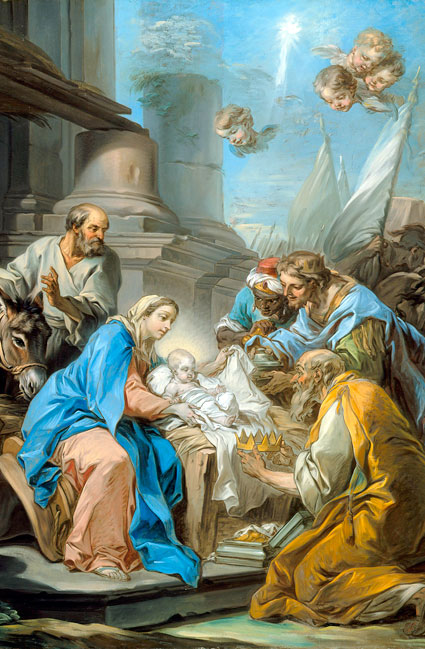Official Website of the
Catholic Diocese of Little Rock
Epiphany reveals Jesus king of all nations
Published: January 3, 2025
The Wise Men from the East followed the star of Bethlehem until it led them to the newborn king, Jesus Christ. They prostrated themselves and presented him with gifts of gold, frankincense, and myrrh. (Matthew 2:1-12) Among Western Christians, tradition holds the names of the Wise Men to be Casper, Melchior and Balthasar. They are regarded as saints and their relics are enshrined in the cathedral at Cologne, Germany.
It is traditionally believed there were three because they presented three gifts and the belief they were kings riding camels comes from two Old Testament prophecies:
“May the kings of Tarshish and the islands bring tribute, the kings of Sheba and Seba offer gifts. May all kings bow before him, all nations serve him." (Psalm 72:10-11) And in Isaiah 60:1-6, which is the first reading on the feast of the Epiphany of the Lord, it says, "Caravans of camels shall cover you, .... All from Sheba shall come bearing gold and frankincense and heralding the praises of the Lord."
According to Arkansas Catholic, the gifts of the Magi to Jesus have important symbolism. "The gold, symbolizing wealth, shows Jesus’ kingship; frankincense, which was burned as an offering to God, stands for his divinity; and myrrh, an anointing oil and herb used in embalming, foreshadows his redeeming death." Bishop Anthony B. Taylor also addressed the meaning of the gifts in his 2017 homily on the epiphany.
 We celebrate the visit of the Magi on the epiphany. It is traditionally observed Jan. 6, but in the United States it is held on the Sunday between Jan. 2 and Jan. 8. It concludes the 12 Days of Christmas, but the season of Christmas continues until the feast of the Baptism of the Lord. The word "epiphany" comes from the Greek "manifestation." The Catechism of the Catholic Church explains that in the epiphany, Jesus was revealed as the "Messiah of Israel, Son of God and Savior of the world."
We celebrate the visit of the Magi on the epiphany. It is traditionally observed Jan. 6, but in the United States it is held on the Sunday between Jan. 2 and Jan. 8. It concludes the 12 Days of Christmas, but the season of Christmas continues until the feast of the Baptism of the Lord. The word "epiphany" comes from the Greek "manifestation." The Catechism of the Catholic Church explains that in the epiphany, Jesus was revealed as the "Messiah of Israel, Son of God and Savior of the world."
"The Magi's coming to Jerusalem in order to pay homage to the king of the Jews shows that they seek in Israel, in the messianic light of the star of David, the one who will be king of the nations. Their coming means that pagans can discover Jesus and worship him as Son of God and Savior of the world only by turning towards the Jews and receiving from them the messianic promise as contained in the Old Testament.
The epiphany shows that 'the full number of the nations' now takes its 'place in the family of the patriarchs.' and acquires 'Israelitica dignitas' (is made 'worthy of the heritage of Israel')." (no. 528)
There are many ways to celebrate the feast of the epiphany at home. The most common is setting up the Magi in different rooms of your home as if to be traveling until they arrive at the manger to pay homage to Jesus. In Spain, children leave their shoes out the night before for the kings to deposit gifts. A similar event is celebrated in Mexico. In France, people enjoy "galette des rois," a pastry with a small king embedded inside. "Whoever gets him is king or queen for the evening, wears a golden paper crown and chooses the first game to be played."
In the United States this takes the form of a king cake and is most popularly eaten on Mardi Gras. Other options include having an epiphany party or blessing your home. And these resources focus on making it fun for children: Catholic Epiphany Home Blessing and Six Family Traditions for Epiphany.
The Diocese of Des Moines suggests a gift exchange, where all gifts are a “gift of self coupon” allowing family members to do chores or display extra kindness as their gift. Other ideas include watching "The Fourth Wiseman," reading "The Gift of the Magi," singing "We Three Kings," serving an international meal to reflect God revealing himself to "the nations," or going out stargazing to reflect on the faith of the Magi and the power of God to bring about the miraculous star.




